
by Cindy Levin | Mar 3, 2015 | 2015, Education, Life Lesson, World Moms Blog, World Voice
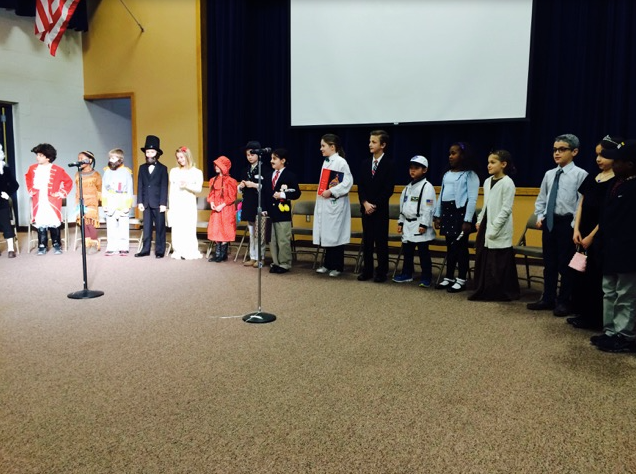
My daughter’s grade school class presented a “Wax Museum” yesterday. It was a program where the students dressed up as prominent historical figures from past and present chosen from short biographies in the school library. Each prepared a short summary of the life of their chosen person to memorize and recite. All the children were adorable. We parents walked out laughing about the cuteness of the kids and the creativity in the costumes they created. As we headed out to the cars, moms and dads chimed in about how that wonderful presentation had the unfortunate side effect of making us think about our own mortality and legacies.
“Man, there’s not a lot of time yet for me to do something amazing!”
“Bill Gates built his fortune by age 31. What have I accomplished?”
“Nobody’s ever going to have write a book about me for the children’s section.”
On the drive home, I started to think about incredible people I know in my own life who don’t happen to be famous enough to be in the biography section of the elementary school library. I wondered what the wax museum would have looked like if some of my everyday heroes had been chosen?
What would their humanly complex, heroic yet ordinary lives sound like in the simplified words of a third grader’s summary?
There would have been a little boy with a taped on blondish mustache and a Hawaiian shirt saying, “My name is Bob Dickerson. I don’t want any child to die especially from something that can be prevented. One time, I saw two girls drowning when they were swimming. I rescued them by grabbing them and bringing them to safety, so I know what it’s like to save a life of a child. When I was diagnosed with cancer, I thought I wouldn’t have much time to live so I quit my job and dedicated the rest of my life to ending needless childhood deaths from disease and hunger by fighting poverty with an organization called RESULTS. Over and over, I asked Congress to use our tax money to save kids’ lives with vaccines, good nutrition, and easy medical treatments. Every single month, I worked with other volunteers to figure out how to talk to our representatives and senators. Together, we brought the number of daily child deaths from 40,000 a day to 17,000 per day. I encouraged and inspired many young leaders to follow my example. “
There would have been a little girl in hiking boots or running shoes saying, “My name is Teresa Rugg. When one of my friends lost his wife and baby to Tuberculosis (TB), I said I would help however I could to make sure people didn’t die from such a terrible disease. I started an organization called TB Photovoice to gather stories of TB patients and survivors and share them to improve the lives of people and their communities. The storytellers take incredible photos of their experiences and present their own words and pictures to people who need to know about TB. I did all this to raise awareness about a disease that most people think doesn’t even exist anymore. I spoke out to Congress about stopping TB in the US and all around the world. I did all of this while living out in Washington State where I could hike and run all over having a fun outdoorsy life, enjoying nature with my two wonderful children, my husband, and my dog.”
There might have even been a little girl wearing either a nice dress and a snappy brown coat or maybe a sweatshirt and yoga pants saying, “My name is Jennifer Burden. When I was a kid and people were saying bad things about people from the Middle East, I thought, ‘If only they could know my Grandma, they could never think something like that!’ I started World Moms Blog from my house, so that moms all over the world could share stories together and foster understanding between cultures. I also became a champion of women’s and girl’s issues, encouraging others to write and speak out about them. I taught my own daughters about being fair and how we can save lives of people who need our help even if we are far away.”
And you know what else? There would probably still be that little boy up there playing Bill Gates. But instead of saying what year he made his first billion dollars, he’d be saying, “In 2015, I promised to give away 1.5 billion dollars – more than even the United States – to the GAVI Alliance to help vaccines reach every child and end polio in my lifetime.”
This is an original post written for World Moms Blog by Cindy Levin.
Who would be in your wax museum?
Cynthia Changyit Levin is a mother, advocate, speaker, and author of the upcoming book “From Changing Diapers to Changing the World: Why Moms Make Great Advocates and How to Get Started.” A rare breed of non-partisan activist who works across a variety of issues, she coaches volunteers of all ages to build productive relationships with members of Congress. She advocated side-by-side with her two children from their toddler to teen years and crafted a new approach to advocacy based upon her strengths as a mother. Cynthia’s writing and work have appeared in The New York Times, The Financial Times, the Washington Post, and many other national and regional publications. She received the 2021 Cameron Duncan Media Award from RESULTS Educational Fund for her citizen journalism on poverty issues. When she’s not changing the world, Cynthia is usually curled up reading sci-fi/fantasy novels or comic books in which someone else is saving the world.
More Posts - Website
Follow Me:


by Cindy Levin | Jan 13, 2015 | 2015, Death and Dying, Family, International, Travel, World Moms Blog, World Voice

Maracas Bay Beach, Trinidad & Tobago. Photo by Lazette Nichols
Looking out of the plane window onto an endless ocean below, I thought about how long it took me to make a journey back to my father’s home country of Trinidad and Tobago, a pilgrimage long overdue.
It had been 30 years since I set foot on the island. My dad grew up in Trinidad and Tobago in the 1930’s when it was still British and roads doubled as donkey trails. The last time I was there at age 13, I was grieving over dad’s sudden death the year before and my cousins took us to see the American comedy hit Ghostbusters. This time, I was racing to Trinidad with my mom because of an email telling us that dad’s sister, my Aunt Cynthia, was in the hospital after a stroke and things looked dire. She had even received last rites. No one expected her to last until Christmas. My phone rang and Mom unexpectedly asked: “How do you feel about going to Trinidad…like, right now?”
As far as I know, there have been only two women in the world ever to be given the name “Cynthia Chang-Yit”: my aunt and me. A typo in an immigration office somewhere between China and Trinidad inadvertently gave my grandfather a unique last name.
Sharing the name made me proud that she was my special aunt and godmother. She always visited us for major family milestones…weddings, graduations, memorable Christmases, and – of course – Dad’s funeral. She seemed elegant to me, appearing every few years in our Minnesota winters bundled in the same fur coat. (Why buy a new winter coat when you live near the equator?) Her eyes crinkled when she smiled at my childhood silliness. I loved how my room held her powdery scent during and after her stay. I liked to usher her to my room so we could sleep in matching twin beds. The super-glued sign on the door back then read, appropriately, “Cynthia’s Room.”
It’s rare in life when one is actually faced with answering the rhetorical question: “If you knew you could see someone you love for one last time, how much would you pay for that chance?” I still don’t precisely know, but it suddenly became clear that it’s way more than the cost of a last-minute plane ticket to the Caribbean.
I boarded with luggage containing black funeral clothes as well as a swimsuit. I didn’t know what would happen. Would I attend her funeral? Sit for hours in a hospital? End up at a beach playing in the surf or staring pensively in grief? The only thing I knew for sure was that I wouldn’t have to wear snow boots.
My family has a very global history and I personally speak out to Congress about global concerns regularly, so why did it take this long to get me back to the islands? How many years went by as I dithered over when a “good time” to go to Trinidad would be? Lack of money, lack of vacation days, exam schedules, babies, a general unease with international travel…there was always something in the way. I’m reminded of the saying, “If you want something, you’ll find reasons. If you don’t, you’ll find excuses.” I eventually have to admit that I didn’t want it bad enough because – let’s face it – there is never a “good time” to go. Like all things in life, it simply has to be a priority or not. When I look at my list of excuses, they’re only the protests of someone not wanting to step out of her comfort zone. I have American friends who travel to see their families in Japan, Brazil, and Malaysia with babies and toddlers. These folks are neither particularly wealthy nor adventurous. They just place a higher value on the bonds of family and showing children what it means to be from the places where their families began.
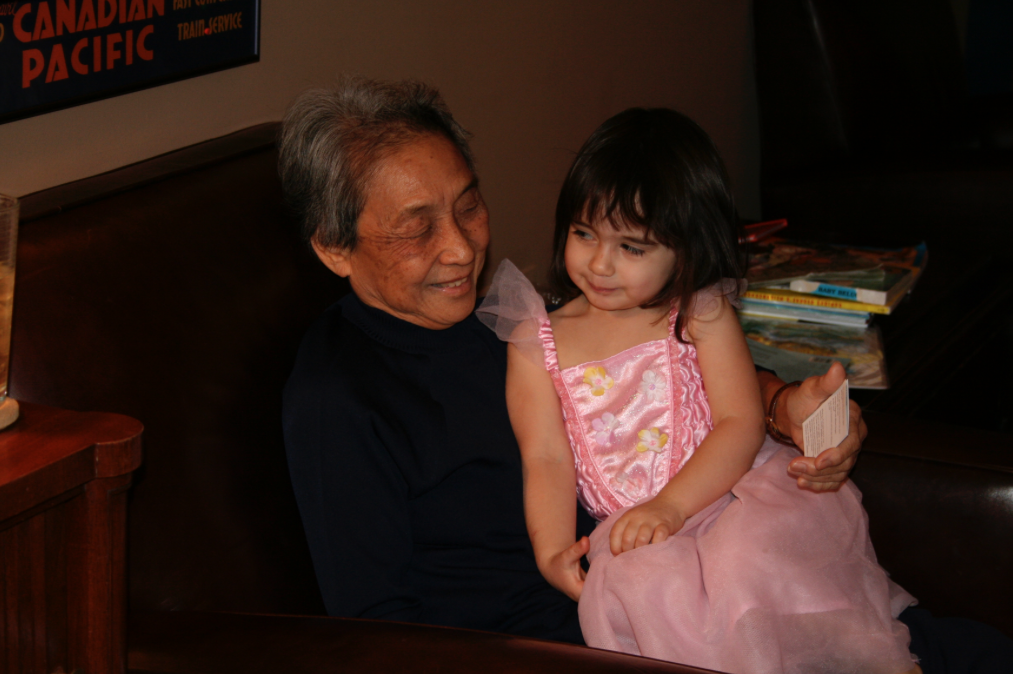
‘Aunt Cynthia’ with the author’s daughter. Photo by Cynthia Changyit Levin
I’m happy to tell you that my mom and I were able to see Aunt Cynthia. As of today, she is at home and still hanging on. She could not speak nor move much when I saw her, but I was rewarded with the recognition on her face that I had finally come to visit. Her eyes crinkled a bit when I held a puppy up for her to see, knowing our shared love of dogs. She gave me exasperated looks when I asked if she liked the current Prime Minister or told her I hadn’t yet tried the local beer. I got the chance to sit by her side to read her the paper, put lotion on her hands, show her pictures of my daughters, give her flowers, sing her Christmas carols, and – above all – tell her I love her.
So, what is my takeaway from my long-overdue trip? Will I become a world traveler now? Will I visit my Trinidad cousins every year with my kids? Honestly, no. I’m still basically the same person who needs a push to use her passport. But I think I can find a happy medium between recreational globetrotting and never going at all. It’s in that middle ground where I found the beautiful experiences of standing on a beach with my mother where my father brought her as a newlywed, consulting with my cousins about our shared family recipes, and sitting at the side of someone who needed me.
Did you ever have the chance to say goodbye to someone you loved before they died, or missed the chance by not making the trip when you could have?
This is an original post written for World Moms Blog By Cynthia Changyit Levin.
Cynthia Changyit Levin is a mother, advocate, speaker, and author of the upcoming book “From Changing Diapers to Changing the World: Why Moms Make Great Advocates and How to Get Started.” A rare breed of non-partisan activist who works across a variety of issues, she coaches volunteers of all ages to build productive relationships with members of Congress. She advocated side-by-side with her two children from their toddler to teen years and crafted a new approach to advocacy based upon her strengths as a mother. Cynthia’s writing and work have appeared in The New York Times, The Financial Times, the Washington Post, and many other national and regional publications. She received the 2021 Cameron Duncan Media Award from RESULTS Educational Fund for her citizen journalism on poverty issues. When she’s not changing the world, Cynthia is usually curled up reading sci-fi/fantasy novels or comic books in which someone else is saving the world.
More Posts - Website
Follow Me:

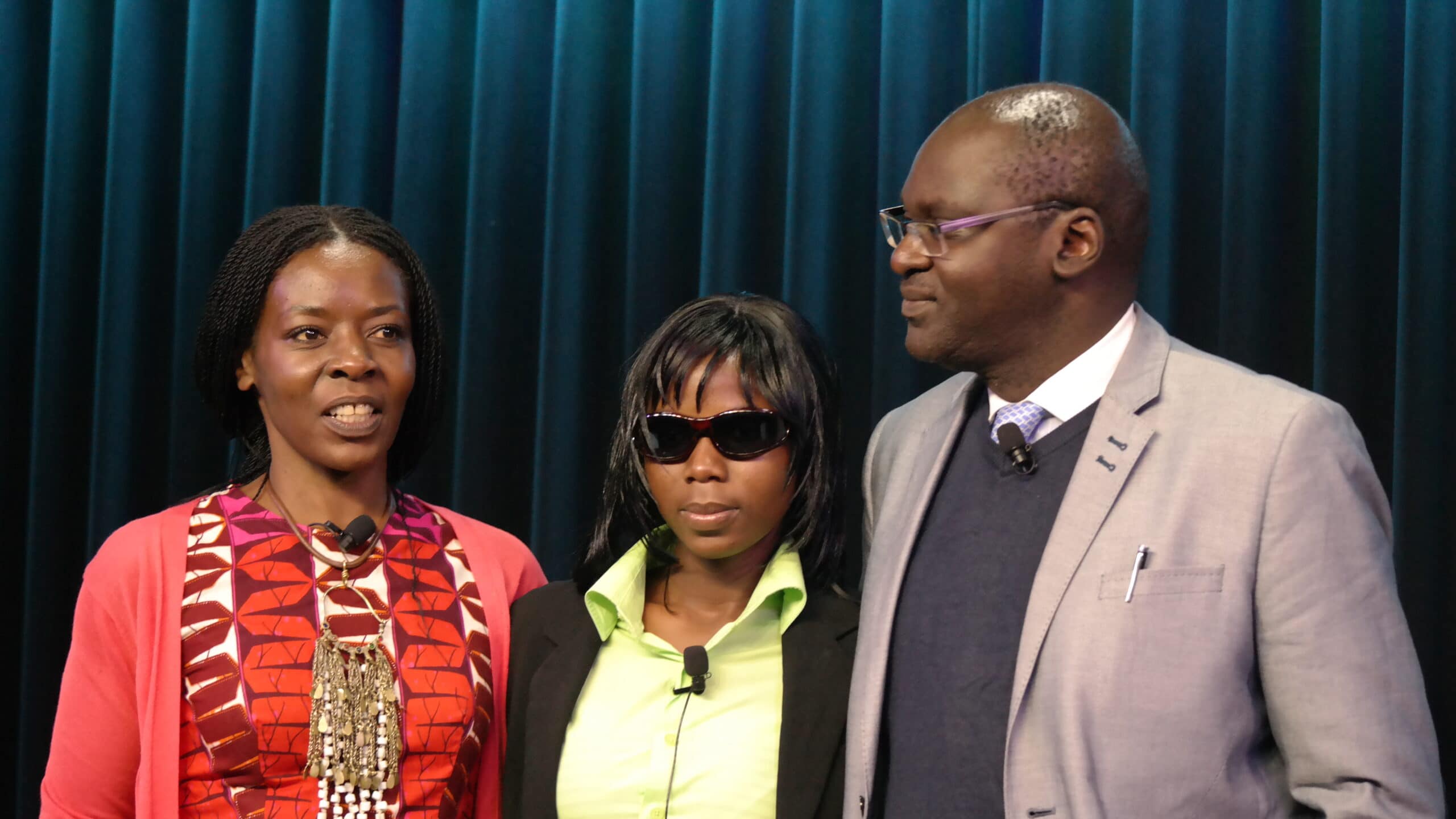
by Cindy Levin | Nov 25, 2014 | 2014, Africa, Awareness, Education, Girls, Human Rights, Humanitarian, Social Good, World Moms Blog, World Voice
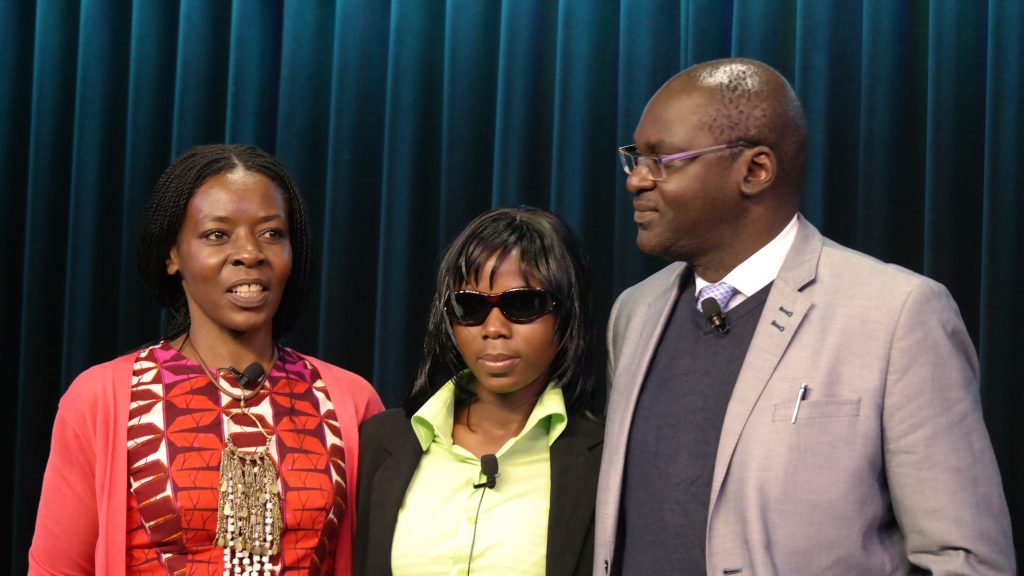
They sat in the back row of the ONE Campaign’s AYA Summit with me in Washington D.C., keeping to themselves and wearing sunglasses in an already darkened room. A computer on their laps, two teenage girls whispered to one another as together we watched videos and heard speakers talking on all ranges of topics affecting girls and women around the world. Vaccines, education, access to electricity, human trafficking, genocide…it was both a heavy and inspiring range of topics as speakers bounced back and forth between storytelling about problems and discussing solutions. Sitting with them and trying (unsuccessfully) to engage them in friendly conversation during breaks, I had no idea how intimately these topics were affecting their lives…
I sat in the back because back row chairs sit beside outlets and I could recharge my phone easily. They sat in back shadows for a very different reason. Because of uncertainty…a desire for anonymity…maybe even fear. One of the two had more immediate reason for concern than the other. Without our knowledge, she was nervously waiting all day for her turn to speak to us and tell us her story.
Her name was Saa* and seven months ago she was kidnapped by Boko Haram from her school in Nigeria.
Last April, the whole world exploded in outrage demanding for these terrorists to #BringBackOurGirls. And then…we heard nothing. Governments searched. Leaders demanded. Parents wept. And we heard nothing.
Then, as if out of the blue, Saa appeared in our midst ready to speak at the AYA Summit to a group of parents armed with laptops and 45 million social media followers.
This is her story.
On April 14, kidnappers from the terrorist group Boko Haram entered Saa’s school in Chibok with a plan to capture all the girls who studied and slept at her school. At 11:30PM, Saa and her classmates heard terrible noises of violence. Scared, she called her father and asked what she should do. He told her to stay where she was and wait for help.
No help came.
Collecting all the girls to a common area, kidnappers started burning everything from the school. Surrounded by weapons, the girls were told if they shouted or ran away, they would all be killed. Gunmen started demanding information about the location of a local mission, the location of the boys in the school (there were no boys), and where the school kept food. Two girls showed them where the food was and the guards emptied the store of food supplies.
They forced them away from the school and gathered them under a big tree, bringing vehicles including small cars and big trucks. The girls were ordered to enter big, high trucks by climbing up upon a small car and into the truck. “They said if any girl did not want to go into the trucks, she should come out and they would kill her,” Saa told us. After moving to another village, they moved the girls from trucks and started filling the car with the girls sitting on laps. There was not enough room for everyone to sit and three girls were left outside. The men asked the first girl if she was Muslim or Christian. She was Muslim, so they moved on and asked the same of the next girl who – despite being Christian – replied that she was Muslim out of fear for what they might do to her. When the third girl admitted that she was Christian under questioning, one of the kidnappers decided he should kill her right there and let the Muslim girls go. Other kidnappers fortunately intervened and convinced him not to kill her then, and there. Amazingly, those three girls were released for lack of room, but told not to turn back or everyone would be killed. Those girls ran away to the town.
As the vehicles started to travel and moved past one village, a few girls started to jump from the trucks. Saa decided for herself that she would rather jump and die than face the uncertainty of what lay ahead. She told her plan to friend saying, “I would rather that my parents have to bury me in a coffin.” Her friend agreed to jump, too. The truck continued through the middle of a forest in the dark with cars following behind. The girls waited for an opportunity when the following cars were not within sight then leapt from the trucks, Saa first and then her friend. After the jump, Saa discovered her friend had injured her leg and was unable to move very far. She helped her friend into the forest away from the road, so they would not be discovered. They moved as far as they could and slept in that spot until morning.
In the morning – with her friend still unable to travel – Saa sought out help. The first person Saa met was a shepherd. She asked him for help, but he refused out of fear for his own safety. He advised them to wait until 9 or 10 AM when some people may travel that way going to market and possibly help them. Saa argued that not many people would come by because the violence from the night before would make them afraid to come. They must move quickly because the “bad people” may follow that road again. Finally, he agreed to help and carried Saa’s friend on a bicycle.
On the road, they did meet people who were coming to look for their daughters who helped bring the girls back to Chibok. Then, they went back to their hometown. When they arrived home, Saa was reunited with her parents who met her in tears. All of her relatives were weeping because of the ordeal.
Saa didn’t cry as she related her story. She spoke softly and quickly in a matter-of-fact manner. I wondered how many times she had told her story and if sticking just to the facts helped her remain detached enough to get the story out. Even though this was only the second time she had spoken publicly about it, I imagine she must have related it many times to her family and to authorities trying to glean clues to recover her classmates who are still missing.
In the audience, we sat in shock…surprised to be in her presence and horrified by the audacity of Boko Haram to violate their freedom in this way. Most of us were mothers who had a very visceral reaction to the thought of someone stealing our daughters away in the night to be sold, raped, married, or killed.
I thought about that horrible conversation Saa’s father in which he faced a terrible choice of how to advise his daughter over the phone. Would you tell your daughter to run and risk her being shot in the back? Or would you tell her to wait for help, knowing that she might be trafficked and violated if no one comes to help? I thought about the shepherd, afraid for his life. He balked, but did the right thing in the end. I admired Saa’s skillful persuasion in arguing with him to provide aid and her courage to leap from a moving truck in the midst of a forest full of danger from animals and humans.
To my horror, on my Twitter feed that very night as we gathered around Saa to thank her for her courage and her story, I saw 25 more girls had been captured by these monsters. In a video delivered 200 days after Saa’s kidnapping, Boko Haram leaders scoff at the idea at negotiating for release along with ceasefire agreements. The group’s leader, Abubakar Shekau, flanked by gunman reportedly said, “The issue of the girls is long forgotten because I have long ago married them off…Don’t you know the over 200 Chibok schoolgirls have converted to Islam? They have now memorized two chapters of the Koran.” According to A World At School, Boko Haram claims to be holding 500 women and girls against their will.
I write this blog because the issue of the 219 Chibok schoolgirls is not forgotten. Not by Saa. Not by me. Not by a long shot. Saa told her story and gave us permission to use her picture for a very specific reason…to have us share it with others. If sharing her picture and her story is a way to get people to remember why we stand up for girls’ education and why the U.S. should put pressure on the Nigerian government to stop these atrocities and recover the victims, then that’s what I will do. And that’s what I ask you to do.
1. Continue to use the #BringBackOurGirls hashtag on Twitter. When you see news about it, tweet it to your networks and your members of Congress
2. Use Saa’s story and write your own blogs or letters to the editor about it to keep it in the media and social media
3. Be a champion for global girls’ education. As I said in my World Moms Blog post last may, What Can Americans Do for Abducted Nigerian Schoolgirls?, “The welfare of the kidnapped girls rests in someone else’s hands in the short-term, but I advocate against poverty and injustice wth an eye for the long-term. While we wait and we pray for these girls, shouldn’t we be using this anger and anguish to secure a future for all girls?”
I’d like to leave you with a happy thought about Saa’s education. Saa, her friend, and two other escaped Chibok schoolgirls have been brought to the United States where they will be able to study freely alongside other young women who don’t know what it means to live in fear for the right to learn. Her family knows she is safe. Her future is in her own hands. But she continues to fear for her classmates…as do we all. Read her story again. Think on it. Then, act on it.
*”Saa” is a pseudonym she uses for her own protection
This is an original post written by Cindy Levin for World Moms Blog.
Cynthia Changyit Levin is a mother, advocate, speaker, and author of the upcoming book “From Changing Diapers to Changing the World: Why Moms Make Great Advocates and How to Get Started.” A rare breed of non-partisan activist who works across a variety of issues, she coaches volunteers of all ages to build productive relationships with members of Congress. She advocated side-by-side with her two children from their toddler to teen years and crafted a new approach to advocacy based upon her strengths as a mother. Cynthia’s writing and work have appeared in The New York Times, The Financial Times, the Washington Post, and many other national and regional publications. She received the 2021 Cameron Duncan Media Award from RESULTS Educational Fund for her citizen journalism on poverty issues. When she’s not changing the world, Cynthia is usually curled up reading sci-fi/fantasy novels or comic books in which someone else is saving the world.
More Posts - Website
Follow Me:


by Cindy Levin | Nov 11, 2014 | 2014, Awareness, Elections, USA, World Events, World Moms Blog, World Voice

Cynthia and her daughters take a family selfie after voting
I’m an American and I voted on November 4th. I’m guessing that most of the global readership of World Moms blog didn’t follow our elections because this is not a presidential election year, but that’s okay. A lot of Americans didn’t either. That’s not okay.
Shamefully, only 38% of Americans voted in this November 4th election, which means 6 in 10 of us didn’t vote.
But that’s life. Low voter turn out in the off years of politics is just the way it goes. People tune out without the razzle-dazzle of a presidential slugfest and a new Congress is elected. But, now what do we do if we want to make our country better? Do we have to wait another two years to have a say? No. Not at all!
As angry as some people in my country tend to get with the leader of our country, the president of the United States is not the only one who has influence over policies that have wide-reaching impact on the lives of Americans and all residents of planet Earth. Members of Congress are elected to represent us in our 50 states and have their own measure of power on domestic and global affairs that can help or hinder a presidential agenda. For instance, the president can make budget recommendations, but only Congress can approve the actual spending of money. Budget decisions, foreign aid policies, gun laws, environmental policies, and a host of other choices are made by senators and representatives all year round.
This leads me to my main point. Election day is not the only day when Americans have a voice in government.
Since important decisions are being made every day, then every single day is an opportunity for Americans to shape U.S. policies whether it be through tweeting, blogging, writing letters to the editor, calling members of Congress, writing handwritten letters to Congress, or meeting face-to-face in Congressional offices. All of these actions are open to us. It is our right as citizens. (By the way, even if you’re not a citizen you can still write to U.S. newspapers or use Twitter to organize)
The idea that Americans can only affect what our government does only once every 4 years is a naive and antiquated notion.

U.S. Representative Jan Schakowksy of Illinois reads a letter from Cynthia’s children about supporting global child survival programs.
TV news – or any news, really – would lead anyone to think that voting or contributing large amounts of money are the only things that citizens can do. When so many people don’t know what kinds of effective actions they can personally take, most people end up just frustrated and giving up on our system without ever truly being a part of it. That’s the bad news. The good news is that this huge gap between most citizens and government creates space for concerned citizen lobbyists to slide right in and have great impact. I’m talking about everyday, concerned citizens just like you!
Even a modest amount of 10-20 phone calls on a topic can sometimes greatly influence a member of Congress because few Americans really bother to do it. A constituent meeting face-to-face with congressional staff or an actual member of Congress is even more rare and makes even more impact. These simple actions can have a great effect, especially if it’s an important yet little known issue.
Take, for example, funding to fight tuberculosis (TB), a highly contagious airborne disease. Most people in the U.S. think it doesn’t even exist anymore if they’ve ever thought about it at all. The truth is that in 2012, 8.6 million people fell ill with TB and more than 1.3 million people died from it, making TB the most deadly curable disease in the world. 95% of cases happening in low or middle-income countries, but since it spreads through the air when an infected person coughs, sneezes, or talks it can jump to wealthy nations even easier than Ebola. If treated improperly or ignored, it gives rise to forms of multi drug-resistant TB, which are far more difficult and costly to treat. RESULTS volunteer advocates keep up the drumbeat to members of Congress to fund the very inexpensive treatments to save lives across the globe and in the U.S. to make a tremendous impact on the dignity and income of people in poverty who can keep working in good health. Since no one is actually lobbying against saving lives from TB, a relatively small number of volunteers can educate their elected officials about it and have a huge impact on global health to the tune of $1.1 billion in new resources last year and $1.4 billion overall for the Global Fund to Fight AIDS, TB and Malaria. All this is done by earnest citizens voicing opinions without the media circus of an election cycle.
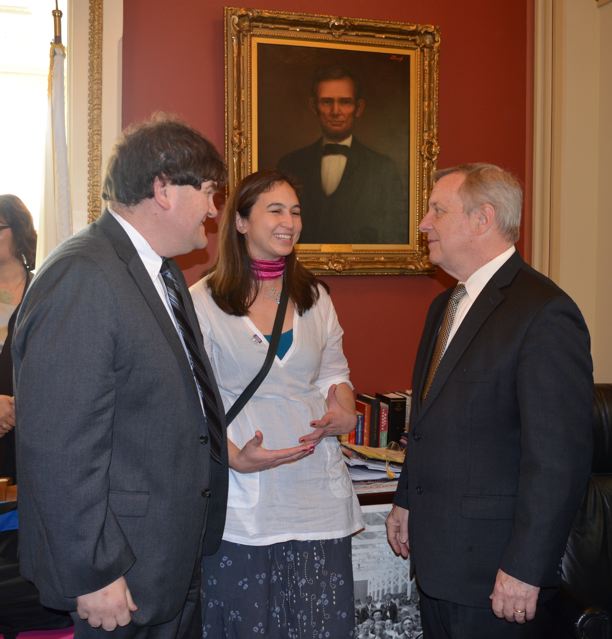
Cynthia and fellow RESULTS activist Richard Smiley talk to U.S. Senator Dick Durbin of IL about microfinance
Every election day, I encourage my fellow Americans to get out and vote, to be sure! That’s where engaged citizenship starts. But we shouldn’t stop there. Let our elected officials know what you want after they’re in office even if – especially if – they are not of the party you favor. Get involved with an advocacy group that shares your global outlook and desires to help mothers and children. (ONE, RESULTS, Shot@Life, and Bread for the World are great places to start) In our country, senators and representatives represent are supposed to work for US. It is your right and privilege to contact them on the issues that are important to you. Don’t waste it!
This is an original post written by Cindy Levin for World Moms Blog.
Do you vote?
Cynthia Changyit Levin is a mother, advocate, speaker, and author of the upcoming book “From Changing Diapers to Changing the World: Why Moms Make Great Advocates and How to Get Started.” A rare breed of non-partisan activist who works across a variety of issues, she coaches volunteers of all ages to build productive relationships with members of Congress. She advocated side-by-side with her two children from their toddler to teen years and crafted a new approach to advocacy based upon her strengths as a mother. Cynthia’s writing and work have appeared in The New York Times, The Financial Times, the Washington Post, and many other national and regional publications. She received the 2021 Cameron Duncan Media Award from RESULTS Educational Fund for her citizen journalism on poverty issues. When she’s not changing the world, Cynthia is usually curled up reading sci-fi/fantasy novels or comic books in which someone else is saving the world.
More Posts - Website
Follow Me:


by Cindy Levin | Aug 19, 2014 | 2014, Awareness, Human Rights, Humanitarian, World Moms Blog, World Voice

I live in St. Louis. Heartbreak has come to my city. It was probably always here, but now that it has taken the form of riots and military-style armed police in American streets of Ferguson, it’s raw and exposed for everyone here and the entire world to see. Many people reading this post will recognize Ferguson from the headlines trending for the days following the death of unarmed, African-American 18-year-old Michael Brown by a police officer.
Ferguson is both very far and very near from where I live depending on perspective. Geographically, it lies about 25 miles north of me. I can be there in about 30 minutes by car. On my side of town this week, it was sunshine and smiles for my kids on their first days of school while so much pain and anger roiled beyond my sight-line from my north-facing front door.
Wednesday evening, I watched in horror as my twitter feed filled with pictures of tear gas clouds rising in the night air. The scene couldn’t have been more different than the peace of my own home where my family sat doing a puzzle and listening to a St. Louis radio station, which gave no indication of the rioting.
The next morning when I woke to local news radio, I heard school was canceled in Ferguson for the next two days due to the violence. In that respect, Ferguson is worlds away because my daily reality is so far from the experience of parents living there. Or is it? Maybe it’s just that I just need to wake up and take a good look at the city I call home now.
I moved to the St Louis area just over a year ago. We came here from Chicago, a city infamous in the past and present for gun violence with it’s own history of racial rioting (Riots Follow Killing of Martin Luther King, Jr, Chicago Tribune). Diversity looks different to me here than our old Chicago suburban neighborhood where over 60 language dialects were spoken in our school district. While our old school had many different shades of color because of the high immigrant population from many countries, our current student population falls much more along a white/black divide of families who have lived in the U.S. for more than a few generations. I want to believe we live in a post-racial society, but I can’t say that when I see there are only African-American children eating the subsidized breakfast at our school with no Caucasian children sitting at the table. I am thrilled there is a system in place to help children from struggling families start the day with a full stomach. Yet I see that we have a ways to go before economic separation doesn’t also result in racial segregation at the elementary school breakfast table.
Despite the inequality before our eyes, people around here tend to feel safe in our southern suburb and separate from the struggles of communities like Ferguson. As the St Louis Post-Dispatch noted in an editorial this week, “We put up our proverbial (and literal) gates in West County, for example, and separate ourselves from the challenges of the urban core.” That perceived distance between communities is a dangerous mindset. When we see our neighbors as far away, we don’t think about their problems as our own and we’re not inclined to lend a hand or vote in ways that are beneficial to us all as the Greater St. Louis community.
The St Louis Post-Dispatch went on to give this observation that stopped me in my tracks:
“Even without that fatal confrontation, statistics suggest Michael Brown would have died earlier than other African-American males just like him who had the good fortune of being born one ZIP code to the south and west. This is but one of the startling and important conclusions of a recent Washington University study titled ‘For the Sake of All.’
…Had he lived, Michael Brown’s projected lifespan was about 15 years less than had he lived just a couple of ZIP codes away on the south side of Interstate 70. In St. Louis, ZIP code is destiny.”
I’m reminded of a quote by U2 lead signer Bono at a National Prayer Breakfast in 2006 regarding global poverty and the inequalities of survival based on country of birth: “Where you live should no longer determine whether you live.” Here in St. Louis and everywhere in the U.S., where you live shouldn’t dictate how long you live, either.
I’m happy to say that Thursday night was a peaceful night in Ferguson and in all of St. Louis County. There will be much more to work through as details come about the investigation of Michael Brown’s death. At least now, however, we can all stop watching the news helplessly and start asking ourselves the tough questions.
• What are we, personally, doing to fight racial and economic inequality?
• Have we talked to our children honestly about racism in the world today?
• How do we feel about militarization of police and what will we say to elected officials about it?
While I struggle with the questions, I’ll take some of the easy actions like donating food to my local church that will take a delivery to the Ferguson food pantry. If you don’t live in St. Louis, the call to wrestle with questions and take action still applies to you wherever you are in the world. Because Ferguson – the struggle with racism and poverty that it represents – is probably closer than you think.
This is an original post written for World Moms Blog by Cindy Levin.
Photo Credit: Flickr Creative Commons, Martin Fisch
Cynthia Changyit Levin is a mother, advocate, speaker, and author of the upcoming book “From Changing Diapers to Changing the World: Why Moms Make Great Advocates and How to Get Started.” A rare breed of non-partisan activist who works across a variety of issues, she coaches volunteers of all ages to build productive relationships with members of Congress. She advocated side-by-side with her two children from their toddler to teen years and crafted a new approach to advocacy based upon her strengths as a mother. Cynthia’s writing and work have appeared in The New York Times, The Financial Times, the Washington Post, and many other national and regional publications. She received the 2021 Cameron Duncan Media Award from RESULTS Educational Fund for her citizen journalism on poverty issues. When she’s not changing the world, Cynthia is usually curled up reading sci-fi/fantasy novels or comic books in which someone else is saving the world.
More Posts - Website
Follow Me:



















